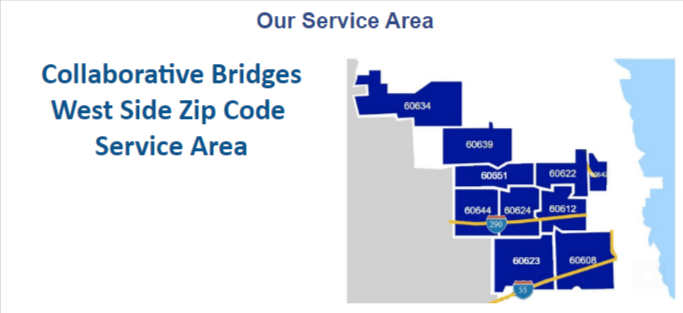Collaborative Bridges is a partnership of historic West Side Chicago
Collaborative Bridges is a partnership of historic West Side Chicago safety net hospitals and community mental health agencies designed to ensure that the care needs of people experiencing mental health and substance abuse are supported in their community, especially after a hospital admission. We are here to improve the health equity of West Side communities. To do this, we are creating a continuity of care between hospitals and communities to put resources closer to those who need it, when they need it.
This quarterly newsletter is being sent to you because you were identified as a friend and associate of Collaborative Bridges and/or one of its many collaborating partners on the West Side of Chicago.
We hope you will stay subscribed to this quarterly publication, but please know that you can unsubscribe at the bottom of this email at any time.
Collaborative Bridges is a partnership of historic West Side Chicago safety net hospitals and community mental health agencies designed to ensure that the care needs of people experiencing mental health and substance abuse are supported in their community, especially after hospital admission. We are here to improve the health equity of West Side communities. To do this, we are creating a continuity of care between hospitals and communities to put resources closer to those who need it, when they need it.
This quarterly newsletter is being sent to you because you were identified as a friend and associate of Collaborative Bridges and/or one of its many collaborating partners on the West Side of Chicago.
We hope you will stay subscribed to this quarterly publication, but please know that you can unsubscribe at the bottom of this email at any time.
Founding Partners
Bobby E. Wright, CBHC
Community Counseling Centers of Chicago
Habilitative Systems, Inc.
Hartgrove Behavioral Health Systems
Humboldt Park Health
The Loretto Hospital
The Need We are Addressing
Collaborative Bridges recognizes that the current healthcare delivery system is failing the city’s most vulnerable residents. What we aim to do is address some of the structural deficiencies in the healthcare system that have led to worse health outcomes for residents of the West Side of Chicago. These include:
Lack of access to care
Lack of stability in the healthcare delivery system
Lack of coordinated, cross-agency focus on the social determinants of health
The transition from acute mental health inpatient to community care is one of the most critical periods for addressing patients’ care needs.
Patients discharged from psychiatric hospital-based care often find this period to be chaotic, stressful and emotionally charged.
Our model embeds mental healthcare professionals with a variety of credentials in the community.
The suicide rate for the first week after discharge is 300 times higher than the general population’s and is most significant in the first few days after discharge.
These innovative care teams incorporate both master-level therapists and community-based care coordinators and are integrated with the hospital and other critical access points.
Collaborative Bridges meets people in their communities and connects them to care needs that improve their well-being to ensure successful stabilization of substance abuse and mental health treatment needs.




